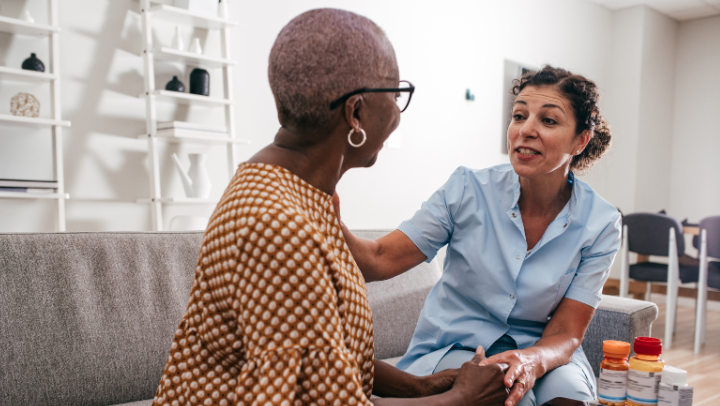The Importance of Caregiver-Resident Relationships in Senior Living
At the heart of a successful senior living community in Tarpon Springs lies the profound and enduring bond between caregivers and residents. These relationships extend beyond physical care, serving as the cornerstone of a thriving community where residents feel valued, respected, and supported.
When caregivers and residents forge deep connections characterized by empathy, patience, and genuine care, a sense of belonging and security permeates the entire environment. This harmonious partnership enhances residents’ daily lives and significantly contributes to their overall well-being, fostering a sense of purpose, joy, and contentment.
Challenges in Building Strong Connections in Senior Living Communities
Cultivating meaningful caregiver-resident relationships in senior living communities can, however, present unique challenges. The fast-paced nature of caregiving, the diverse needs and personalities of residents, and the inherent emotional demands of the profession can all create barriers to building the deep connections that are so crucial.
Caregivers may need to be more balanced, juggling multiple responsibilities and needing help devoted to each resident. On the other hand, residents may be hesitant to open up or may have experienced past disappointments that make them wary of forming new connections. Navigating these complexities requires a thoughtful and intentional approach.
Strategies for Enhancing Caregiver-Resident Relationships
Fortunately, senior living communities can implement a variety of strategies to foster stronger caregiver-resident relationships. By prioritizing these efforts, they can create an environment that nurtures meaningful connections and enhances the overall experience for both caregivers and residents.
Creating a Positive and Nurturing Environment
The foundation for solid caregiver-resident relationships begins with creating a positive environment within the senior living community. The leadership team sets the tone and establishes a culture of empathy, respect, and open communication.
When caregivers feel supported, valued, and equipped with the necessary resources, they are better able to devote their full attention to the residents in their care. Providing comprehensive training, ongoing professional development opportunities, and a collaborative work environment can all contribute to a positive and fulfilling caregiving experience.
Effective Communication Techniques for Caregivers
Effective communication is a cornerstone of building solid caregiver-resident relationships. Caregivers must be skilled in active listening, empathetic dialogue, and engaging residents in meaningful conversations. This helps residents feel heard and understood and allows caregivers to gain deeper insights into the residents’ needs, preferences, and life experiences.
Techniques such as open-ended questioning, reflective listening, and validating residents’ emotions can foster a sense of trust and rapport. Caregivers should also be mindful of their body language, tone of voice, and overall demeanor, ensuring they convey a warm and approachable presence.
Empathy and Understanding in Caregiving
Empathy is essential for caregivers in senior living to understand and connect with residents emotionally. By cultivating empathy, caregivers can connect with residents on a deeper level, anticipating their needs and responding with compassion.
Encouraging caregivers to take the time to learn about each resident’s unique life story, personal preferences, and emotional needs can foster a greater sense of understanding and connection. When residents feel truly seen and heard, they are more likely to open up and engage in meaningful relationships with their caregivers.
The Role of Activities and Engagement in Building Connections
Meaningful resident engagement and a thriving community atmosphere are essential to developing deep, lasting caregiver-resident connections. By participating in group activities, sharing experiences, and collaborating on projects, caregivers and residents can discover common interests, exchange stories, and build a sense of camaraderie.
These shared experiences enhance the residents’ quality of life and provide caregivers with valuable insights into the residents’ personalities, talents, and perspectives. This, in turn, can lead to more personalized and enriching interactions, further strengthening the bond between caregivers and residents.
The Impact of Caregiver-Resident Relationships on Resident Well-Being
Strong caregiver-resident relationships positively impact the overall well-being of senior living residents. When residents feel genuinely cared for, understood, and supported, they experience a heightened sense of security, belonging, and emotional fulfillment.
Promoting self-care, stimulating participation in activities, and fostering a positive mindset can significantly improve residents’ physical well-being. Additionally, solid caregiver-resident relationships have been linked to reduced incidences of depression, anxiety, and other mental health challenges commonly experienced by older adults in senior living communities.
The Power of Strong Caregiver-Resident Relationships in Senior Living
Strong caregiver-resident relationships must be considered in the dynamic and ever-evolving world of senior living. By prioritizing the development of these meaningful connections, senior living communities can foster a deep sense of community, trust, and overall well-being for their residents.
Discover a fulfilling lifestyle at Addington Place of East Lake in Tarpon Springs. Our compassionate caregivers create a warm, engaging community where residents thrive. Schedule a tour today to learn more: 727-943-8878.
